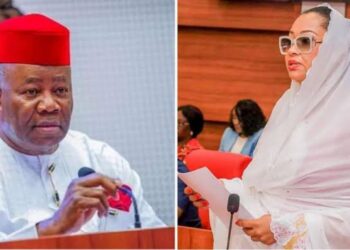Nigerian state governors spent N1.99tn on recurrent expenses in 2024, despite falling short of revenue targets, highlighting concerns over fiscal discipline.
New figures have revealed that 29 Nigerian state governors collectively spent N1.994 trillion on recurrent expenditures between January and September 2024.

This significant expenditure, which includes costs for refreshments, sitting allowances, travel, and utilities, came amidst a broader fiscal imbalance in many states, which failed to meet their revenue-generating targets.
Also read: Kogi Governor condemns vigilantism, calls for peace following Fulani settler’s killing
While states obtained loans amounting to N533.29 billion and spent N658.93 billion servicing debts to both local and international creditors, they collectively generated only N1.92 trillion in internally generated revenue (IGR), falling short of their N2.868 trillion target by a deficit of N948.28 billion.
The recurrent expenditure data does not include personnel costs but highlights a persistent issue: the growing cost of governance across states despite improved federal allocations.
In fact, states have benefited from a 40 per cent increase in statutory allocations from the Federation Account this year, driven by the elimination of fuel subsidies and the unification of the foreign exchange market.
The Federation Accounts Allocation Committee (FAAC) distributed N3.473 trillion in the second quarter of 2024, reflecting a 1.42 per cent increase from the previous quarter.
Of this, the Federal Government received N1.102 trillion, while states collectively received N1.337 trillion, and local governments shared N864.98 billion.
However, the increased funding has not translated into better services or living standards for citizens. A breakdown of state spending shows that Lagos, Plateau, and Delta states incurred the highest recurrent expenses, amounting to N375.19 billion, N144.87 billion, and N121.54 billion respectively.
This spending includes not just salaries, but also operational costs such as electricity, internet, telephone, water, and sewage charges.
A deeper look at state fiscal performance highlights a troubling trend. For example, Lagos State, despite generating the highest IGR of N912.17 billion, spent a significant N375.19 billion on recurrent costs.
Meanwhile, states like Bauchi and Abia struggled with revenue generation, accumulating large debts in the process.
Bauchi spent N99.31 billion on recurrent expenses but generated only N15.92 billion of its target revenue, borrowing N33.64 billion in the process.
Niger State was the highest borrower during the review period, taking loans of N79.09 billion, followed by Katsina with N72.89 billion.
In contrast, Delta, which generated N97.02 billion in revenue, spent a substantial N121.54 billion on recurrent expenses but did not take on new loans.
In terms of debt servicing, states such as Edo, Kebbi, and Kogi had to allocate significant portions of their budgets to service existing debts, which further strained their finances.
For instance, Kogi State spent N51.68 billion on loans and repaid N18.12 billion in debt, despite generating only N19.86 billion in revenue.
Several states also experienced significant fiscal shortfalls, underscoring the mismanagement and lack of fiscal discipline.
Professor Segun Ajibola, an economics professor at Babcock University, attributed this to inadequate oversight and accountability, which he believes has allowed state governors to operate without sufficient transparency.
Ajibola also noted that state assemblies had largely abandoned their role in scrutinising state finances, leaving governors with unchecked power to manage budgets.
He warned that without proper fiscal reforms, Nigeria’s current fiscal structure may not be sustainable.
The continuing trend of high recurrent expenditures amid low revenue generation and escalating debts has raised concerns about the sustainability of Nigeria’s fiscal federalism and its long-term impact on economic growth and development.









